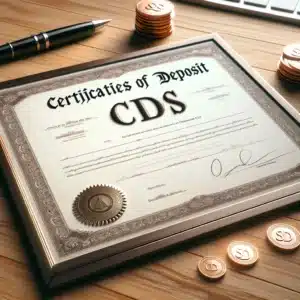This page lists significant certificate of deposit pros and cons.
So as to allocate funds better, investors must be aware of investing in CDs pros and cons. Investors can assess if CDs fit their investing strategy and risk tolerance by comparing these elements to their financial objectives and situation.
If you are looking to invest as an expat or high-net-worth individual, which is what I specialize in, you can email me (advice@adamfayed.com) or WhatsApp (+44-7393-450-837).
Investors can evaluate if CDs fit their investing strategy and risk tolerance by comparing the certificate of deposit pros and cons against their financial objectives and situation.
Certificate of Deposit Pros and Cons
Advantages of CDs

Certificates of Deposit (CDs) are commonly acquired through financial institutions such as banks and credit unions.
When you invest in a CD, you are effectively lending money to the financial institution, and, in return, they pay you back in fixed, regular payments.
You commit your funds to the CD for a specific period, receiving a monthly interest payment.
The original investment is typically returned in a lump sum on the CD’s maturity date. CDs offer various investment benefits.
Predictable Income
CDs are often seen as a “set it and forget it” investment, requiring no continuous monitoring.
They provide investors with a secure means of earning a predictable income stream, especially when using a CD ladder strategy.
Competitive Interest Rates
CDs usually offer higher interest rates than traditional savings accounts, making them appealing to individuals seeking assured access to their cash.
Longer maturity dates generally yield higher interest rates than shorter maturities.
Thus, providing investors with a greater incentive to choose a CD over a savings account, particularly those with longer time horizons.
Lower Risk
Backed by the Federal Deposit Insurance Corporation (FDIC) or the National Credit Union Administration (NCUA), CDs are low-risk investment options.
The FDIC and NCUA provide up to $250,000 in insurance per depositor in case of bank failure, making CDs a secure addition to a portfolio invested in riskier assets like stocks.
Low Minimum Opening
Many certificates of deposit have either no minimum investment requirement or low minimums.
This allows individuals to start earning returns on their investments without needing a substantial amount of savings.

Disadvantages of CDs
While the straightforward approach to investing in CDs involves purchasing one and holding it until maturity, there are risks and limitations associated with this strategy.
Let’s delve into the drawbacks of investing in CDs.
Interest Rate Risk
If interest rates increase after you’ve purchased a CD, you might miss out on higher rates until the CD matures.
This can result in your CD earning a lower rate than what is currently available.
Additionally, an overemphasis on CDs in your investment portfolio may cause you to forego returns from higher-risk, higher-reward investments.
Inflation Risk
When inflation rises, the interest earned on a CD may not keep pace with the broader economy, diminishing your spending power.
In situations where inflation surpasses the interest rate, your CD’s value will decline in real terms, affecting its purchasing power.
Funds Access Risk
Invested funds in a CD are typically inaccessible until the CD matures.
Early withdrawal often incurs a financial penalty, and even after maturity, there’s a limited window (often 7 days) for withdrawing funds.
If this window is missed, the money is automatically reinvested in a new CD with a similar maturity length.
Penalty Risk
Early withdrawal penalties can vary, with most providers deducting one or several months’ worth of interest as a penalty.
It’s essential to carefully compare penalties across different institutions, considering factors like brick-and-mortar banks generally having lower penalties than internet banks.
Investors need to shop carefully and pay attention to the details to make informed decisions about penalties.
Pained by financial indecision? Want to invest with Adam?

Adam is an internationally recognised author on financial matters, with over 760.2 million answer views on Quora.com, a widely sold book on Amazon, and a contributor on Forbes.


